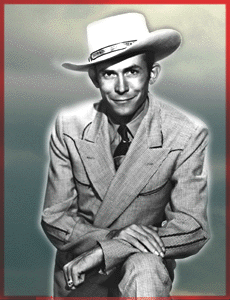
Born:
Hiram Williams
September 17, 1923
Died: January 1, 1953
Hiram
was the second child of Lon and Lillie Williams.
Lon, a WWI veteran, was hospitalized
during most of Hankís
early life, leaving the boyís upbringing to his strong-willed
mother.
Small and fragile from the beginning (and afflicted with spina bifida),
Hank
may well have gravitated toward music as an alternative to sports.
While living
in Georgiana, he befriended Rufus Payne, a black street
musician known as "Tee-Tot."
Years later, Hank
would say that Payne had given him "all the music training
I ever had,"
and most biographers consider Payne the source of the noticeable
blues thread running through Hankís music.
Known as the greatest country
singer of all times, Hank Williams Sr.
was one of the best song writers country
music has ever known.
Unlike many other country singers, Williams
wrote most
of the songs he sang. With time, his songs including
"Cold, Cold Heart,"
and "Your Cheating Heart" have become classics
of American music history.
Before
Hank Williams Sr. became a legend of country music,
he had to overcome numerous
difficulties. Because of his father's bad
health, Williams' s family was very
poor. His father, Lonnie was a farmer
and log trim engineer, his mother, Lilly,
was a church
organist. When Williams was seven, his father disappeared forcing
him to work selling peanuts, newspapers and shinning shoes to help
support
his family. By the time he was fourteen, Williams was starting a
country band.
His style was influenced by the sounds of
gospel, Ernest Tubb, Roy Acuff .
Writing
and singing his own songs, Williams won an amateur contest
in Montgomery, Alabama
for his performance of "WPA Blues,"
which he wrote. In 1937, Williams
formed his own band, the
Drifting Cowboys, which played in Alabama honky tonks.
Williams' s
first years in the band where harsh. During World War II he had to
quit
and work as a welder in shipyards. However, after the war he went
back to his
true interest, music.
In 1946, Williams and his wife, Audrey, moved to Nashville
where
they called Fred Rose, Nashville's biggest music writer and publisher.
After
hearing a few of Willams's songs, Rose immediately signed him
to a contract.
Under Rose's direction, Williams got a contract with MGM
Records and got his
first hit "Move It on Over," which landed him a
job on a radio show
in Shreveport, the "Louisiana Hayride."
Rose also helped Williams polish
his songs to attract the pop music market.
The Williams-Rose team worked well.
"Cold, Cold Heart," one of Williams's
tunes, became a number one country
hit as well as a pop hit for Tony Benett.
Roger Williams said : "Itwas a
perfect union: Williams's native genius, Rose's craftsmanship and sure sense of the
market."
Williams songs were a success on the "Louisiana Hayride."
"I Heard You Crying in Your Sleep," and "Lovesick Blues"
were just
two of the songs which earned Williams an opportunity to perform on
the Grand Ole Opry. His debut, on June 11, 1949, is still considered a
precious
moment in country music history. The audience brought
Williams back for six encores
of "Lovesick Blues" and had to be
quieted in order for the show to
continue. Despite his well-publicized
drinking problems, popular demand brought
Williams
back to the Opry and made him a regular. Williams needed a band to
perform
with, so he reorganized the Drifting Cowboys and added other
studio musicians
who traveled with him to do live performances across
the U.S., Canada and even
to Germany where they entertained American
troops.
A year later, the demand
for Williams was the highest of any other
country star. Songs such as "Why
Don't You Love Me?" and "Long Gone
Lonesome Blues" became number
one hits increasing Williams's popularity
even outside the country music sphere.
Hank the writer
often seemed preoccupied with mortality and the futility of human
relationships-- his marriage to Audrey was now in steady decline, and
those
who knew him could easily see the real-life parallels in songs like
"Youíre
Gonna Change (Or Iím Gonna Leave),"
"Why Donít You Love Me" and
"Cold, Cold Heart." Clearly, here was
a man displaying his demons for
all to see. Hank didnít have to "interpret"
sad songs; he had only
to sing from his heart.
In 1952 he was fired from the Opry for drunkenness,
and he returned to
the "Louisiana Hayride" for a brief period. His
first marriage ended in
divorce, and he became somewhat a laughingstock for his
wedding to a
Louisiana beauty--the ceremony was conducted twice, in public, and
admission was charged. By that time Williams was a walking victim of
drug
abuse--a back ailment from his early years led to the use of
painkillers in addition
to alcohol.
On New Year's Eve, 1953, Williams died of a heart attack on
his way
to Canton, Ohio where he was to perform. Unlike other singers,
Williams
had a special gift, he could produce and sing beautiful songs in a
sincere and
honest manner that everyone could relate to. He was without a
doubt, one of the
greatest singers in the history of country music. He
had given country music much
of its standard
repertoire, a new definition of stardom and a
legend so enduring
that he is still the model for
countless singers and songwriters.
Death
only enhanced Williams's appeal to his legions of fans.
A number of Williams
singles were released posthumously,
including the classic "Your Cheatin'
Heart." To this day Hank Williams
remains one of the best-selling country
singers, with numerous albums
in print in any given year. His songs have been
covered countless times
by all kinds of singers--especially his famous son, Hank,
Jr.
Royalties on Hank Williams songs have earned the Williams family
millions
of dollars in the decades since the performer's death.
It is certainly not surprising
that he was the very first entertainer elected to the prestigious Country Music Hall
of Fame when it opened in 1961.